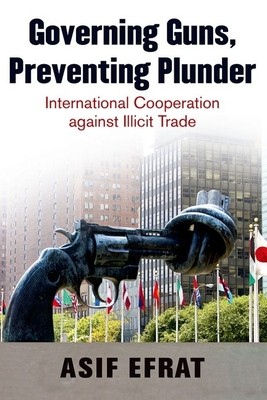
- We will send in 10–14 business days.
- Author: Asif Efrat
- Publisher: Oxford University Press, USA
- ISBN-10: 019020687X
- ISBN-13: 9780190206871
- Format: 15.6 x 23.4 x 2.1 cm, softcover
- Language: English
- SAVE -10% with code: EXTRA
Reviews
Description
From human trafficking to the smuggling of small arms to the looting of antiquities, illicit trade poses significant threats to international order. So why is it so difficult to establish international cooperation against illicit trade? Governing Guns, Preventing Plunder offers a novel, thought-provoking answer to this crucial question.
Conventional wisdom holds that criminal groups are the biggest obstacle to efforts to suppress illicit trade. Contrarily, Asif Efrat explains how legitimate actors, such as museums that acquire looted antiquities, seek to hinder these regulatory efforts. Yet such attempts to evade regulation fuel international political conflicts between governments demanding action against illicit trade and others that are reluctant to cooperate. The book offers a framework for understanding the domestic origins of these conflicts and how the distribution of power shapes their outcome. Through this framework, Efrat explains why the interests of governments vary across countries, trades, and time. In a fascinating empirical analysis, he solves a variety of puzzles: Why is the international regulation of small arms much weaker than international drug control? What led the United States and Britain to oppose the efforts against the plunder of antiquities, and why did they ultimately join these efforts?How did American pressure motivate Israel to tackle sex trafficking? Efrat's findings will change the way we think about illicit trade, offering valuable insights to scholars, activists, and policymakers.
EXTRA 10 % discount with code: EXTRA
The promotion ends in 17d.06:31:44
The discount code is valid when purchasing from 10 €. Discounts do not stack.
- Author: Asif Efrat
- Publisher: Oxford University Press, USA
- ISBN-10: 019020687X
- ISBN-13: 9780190206871
- Format: 15.6 x 23.4 x 2.1 cm, softcover
- Language: English English
From human trafficking to the smuggling of small arms to the looting of antiquities, illicit trade poses significant threats to international order. So why is it so difficult to establish international cooperation against illicit trade? Governing Guns, Preventing Plunder offers a novel, thought-provoking answer to this crucial question.
Conventional wisdom holds that criminal groups are the biggest obstacle to efforts to suppress illicit trade. Contrarily, Asif Efrat explains how legitimate actors, such as museums that acquire looted antiquities, seek to hinder these regulatory efforts. Yet such attempts to evade regulation fuel international political conflicts between governments demanding action against illicit trade and others that are reluctant to cooperate. The book offers a framework for understanding the domestic origins of these conflicts and how the distribution of power shapes their outcome. Through this framework, Efrat explains why the interests of governments vary across countries, trades, and time. In a fascinating empirical analysis, he solves a variety of puzzles: Why is the international regulation of small arms much weaker than international drug control? What led the United States and Britain to oppose the efforts against the plunder of antiquities, and why did they ultimately join these efforts?How did American pressure motivate Israel to tackle sex trafficking? Efrat's findings will change the way we think about illicit trade, offering valuable insights to scholars, activists, and policymakers.


Reviews